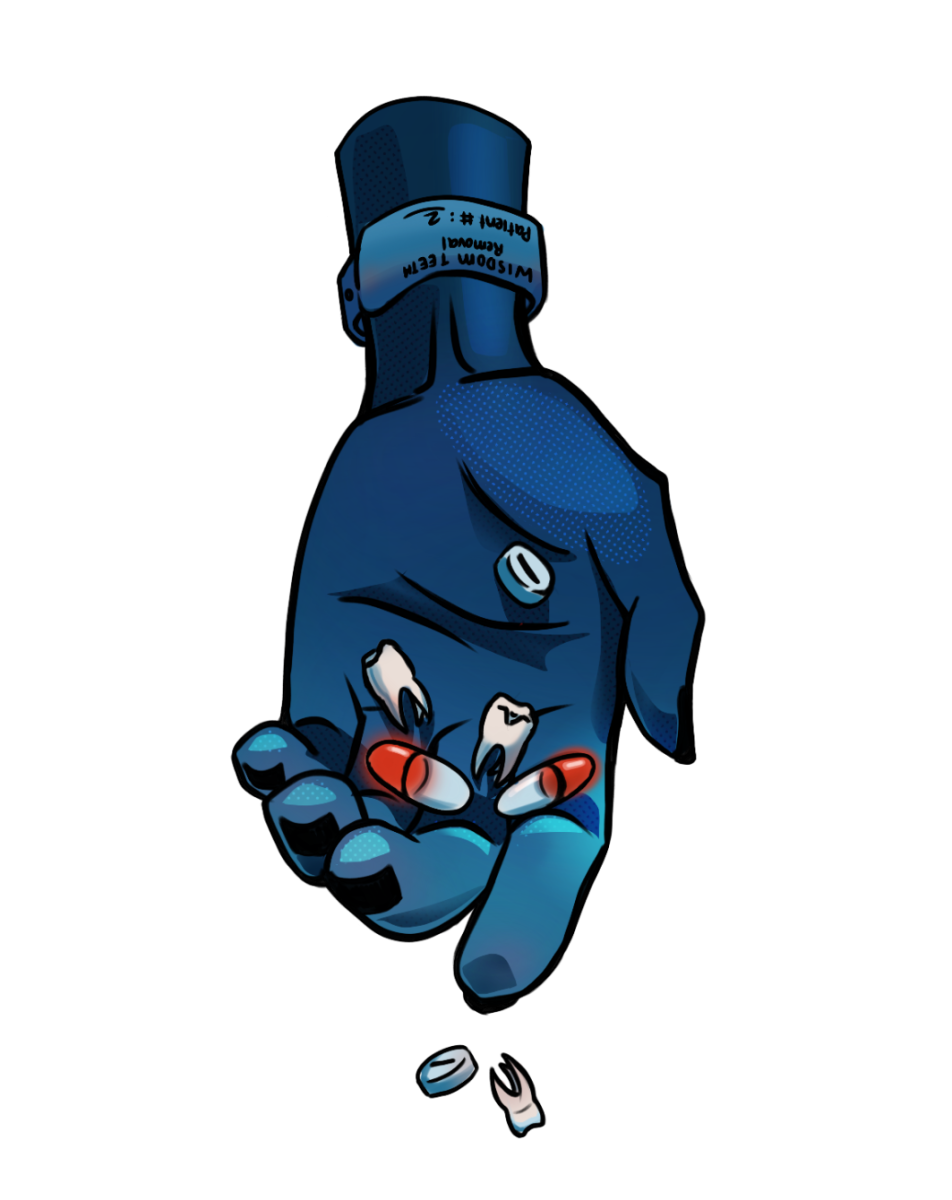A few hours after having my wisdom teeth extracted and handed to me in a plastic bag, I lay on the couch in immense pain. The ice on my face reduced the pain only minimally, and I knew I needed something stronger.
My dad came up with the painkillers the dentist had prescribed before surgery, and I was surprised to find that one of them was Vicodin, an opioid. Since I knew of the opioid crisis gripping our nation, I wondered why Vicodin had been prescribed even before I had surgery.
In his memoir “Hillbilly Elegy,” Vice President JD Vance describes his mother’s descent into opioid addiction. His mother Bev was a nurse raising her children like so many other parents, until one day she got a bad headache at work. She took a Vicodin pill, the same opioid I was prescribed by my dentist, and she loved the way it made her feel.
After that, she began stealing and taking stronger opioids, and her life spiraled out of control. She lost her nursing license and access to prescription opioids. She started taking heroin, an illegal opioid, and her family life fell apart, leaving deep scars on her children. Like Bev, many people who are addicted to opioids started off by taking them for simple, legitimate reasons such as a headache, a back injury, or dental surgery.
Over the last 20 years, opioid overdoses have become a large cause of death in the U.S. Opioids upheave the lives and families of over 2.1 million people in the country who suffer from opioid use disorder. According to the Centers for Disease Control, around 87,000 people in the U.S. died from an opioid overdose in 2024, down from over 100,000 deaths in 2022. With the tremendous risks of taking opioids to manage pain, medical professionals should prescribe them only as a last resort, prioritizing non-opioid painkillers like Tylenol and ibuprofen instead.
Opioids work by activating opioid receptors in the brain, which reduce the pain experienced by the user and boosts their feelings of pleasure. But they don’t treat the inflammation that causes pain. When the opioid effect wears off, the pain can come back even stronger, which causes the person to reach for more opioids, thus creating a dependency that can lead to addiction.
In contrast, non-opioid pain medications like ibuprofen — commonly referred to by its brand names, Motrin or Advil — reduce pain by reducing inflammation. Ibuprofen and Tylenol, another non-opioid pain medication, are not addictive but can have other side effects at high doses such as liver damage in the case of Tylenol and stomach irritation in the case of ibuprofen.
In a study conducted by researchers at Stanford University, out of nearly 15,000 young people who received initial opioid prescriptions from their dentists in 2015, 6.8% had additional opioids prescribed three to 12 months later and 5.8% were diagnosed with opioid abuse during the 12 months after the initial prescription. In a comparison group that did not receive an opioid prescription from their dentists, 0.1% got another opioid prescription and 0.4% were diagnosed with opioid abuse over the same period. Teens from 16 to 18 years old in particular were significantly more likely to have persistent opioid use than older groups.
This could suggest prescribing opioids to young people exposes them to opioids, thus increasing their risk of long term opioid addiction.
According to a commentary in the Journal of the American Dental Association, surgical extraction of wisdom teeth is a procedure provided to approximately 3.5 million young adults in the United States each year. If 5.8% of people are diagnosed with opioid abuse within 12 months after their prescription, then over 200,000 people every year could be newly affected.
Let’s apply this to Paly students: if 2,000 students had their wisdom teeth removed and opioids prescribed, around 116 people would likely be diagnosed with opioid abuse within 12 months of their trip to the dentist.
Corroborating the Stanford study, a different study done by researchers at the University of Michigan showed that young people ages 13 to 30 who filled an opioid prescription immediately before or after wisdom teeth extraction were nearly 2.7 times as likely as their peers to still be filling opioid prescriptions weeks to months later.
A common perception is opioids are more effective than non-opioid painkillers at treating pain, but after dental surgery, research shows non-opioid painkillers are more effective.
In a randomized clinical trial done by Rutgers Health, over 1,800 adults had their wisdom teeth removed, and those assigned to take Vicodin with Tylenol experienced significantly more pain than those assigned to take ibuprofen with Tylenol.
So with all of this data, why do dentists continue to routinely prescribe opioids to teenagers getting wisdom tooth extractions?
I tried to contact my dentist, but they did not respond for comment. However, a commentary published in the Journal of the American Dental Association provides some insight.
“Given that (dentists) actually do not know how much pain a patient will experience, (they) most often provide a prescription for an opioid (painkiller) sufficient to manage the worst case scenario,” the authors wrote.
The authors also suggested the placebo effect from obtaining an opioid prescription may reduce a patient’s pain.
“In clinical practice, prescription opioid formulations produce significantly enhanced placebo responses,” the authors wrote. “With these prescription drugs, patients incur additional costs, the inconvenience of traveling to a pharmacy, and receipt of written and verbal precautions.”
In other words, when patients go through the trouble of filling a prescription to obtain opioids, they may think opioids are effective because there has to be a reason for the trouble.
This doesn’t mean opioids should never be taken after dental surgery. Each person experiences pain differently, so while the data shows that in general non-opioid painkillers are more effective, some people may find opioids treat their pain better. If this is the case, because of the risk of addiction, using opioids should be a last resort to treating unbearable pain, after everything else has been tried.
Alan Schroeder, a clinical professor of pediatrics at Stanford and the lead author of the Stanford study, said he agrees opioids should be a secondary option and if the situation demonstrates that they are needed, they should be prescribed at a very limited quantity.
“There’s no reason that someone who has their wisdom teeth out needs 20 or 30 pills,” Schroeder said. “If you need 20 oxycodone for your wisdom tooth extraction, you should be going back to the oral surgeon ASAP, because something is wrong.”
Dentists may also still be prescribing opioids due to nefarious pharmaceutical companies, which have long deceived doctors and dentists about the safety and addictive potential of opioids, which has led to their widespread overprescription.
“We were taught that (opioids are not addictive),” Schroeder said. “When I was in med school and early in residency, I told families, I told patients, ‘You don’t have to worry about it.’ And I was dead wrong.”
Schroeder said he hopes dentists will educate patients on the dangers of opioids so they do not demand prescriptions.
“I would hope that most oral surgeons are having really serious conversations with patients saying, ‘We really encourage you to avoid opioids. Take ibuprofen around the clock for the first couple days and really try to avoid it,’” Schroeder said.
Opioid addictions ruin lives and tears families apart everywhere. It is within our power as patients and families to let dentists and doctors know that we may not want opioid prescriptions, with the hope they will eventually change their practices.
Teens who are getting their wisdom teeth extracted, as well as their parents, should be mindful of this data and need to realize their choice of painkiller can potentially affect the trajectory of their lives. A healthy and fulfilling life is hard to lead if one is addicted to opioids.
Beyond opioid use for dental surgery, Schroeder also questions the necessity of preemptive wisdom tooth extraction before the teeth cause problems.
“Let’s have more conversations about, do these wisdom teeth absolutely need to come out?” Schroeder said. “What is the harm in waiting one year, two years, four years, five years, maybe even waiting until they’re at a less vulnerable age? This is a really vulnerable age for kids to want to experiment with things … I would try to put it off in my kids until I was really convinced that the teeth were causing a problem. ”
However, this is not to say that nobody needs wisdom tooth surgery until they are in their late 20s.
“I’m sure there are some patients who really need (wisdom teeth extraction), but I just don’t think all the patients that are getting it need it,” Schroeder said.
In the end, we returned my prescribed Vicodin to the pharmacy, and I took Tylenol and ibuprofen instead. Those painkillers managed the pain reasonably well, and my face de-puffed by the end of the day. My biggest complaint was having to eat things with the consistency of baby food. Many can spare their future lives from pain if they use opioids only as a last resort and realize the life-changing potential of one decision.


